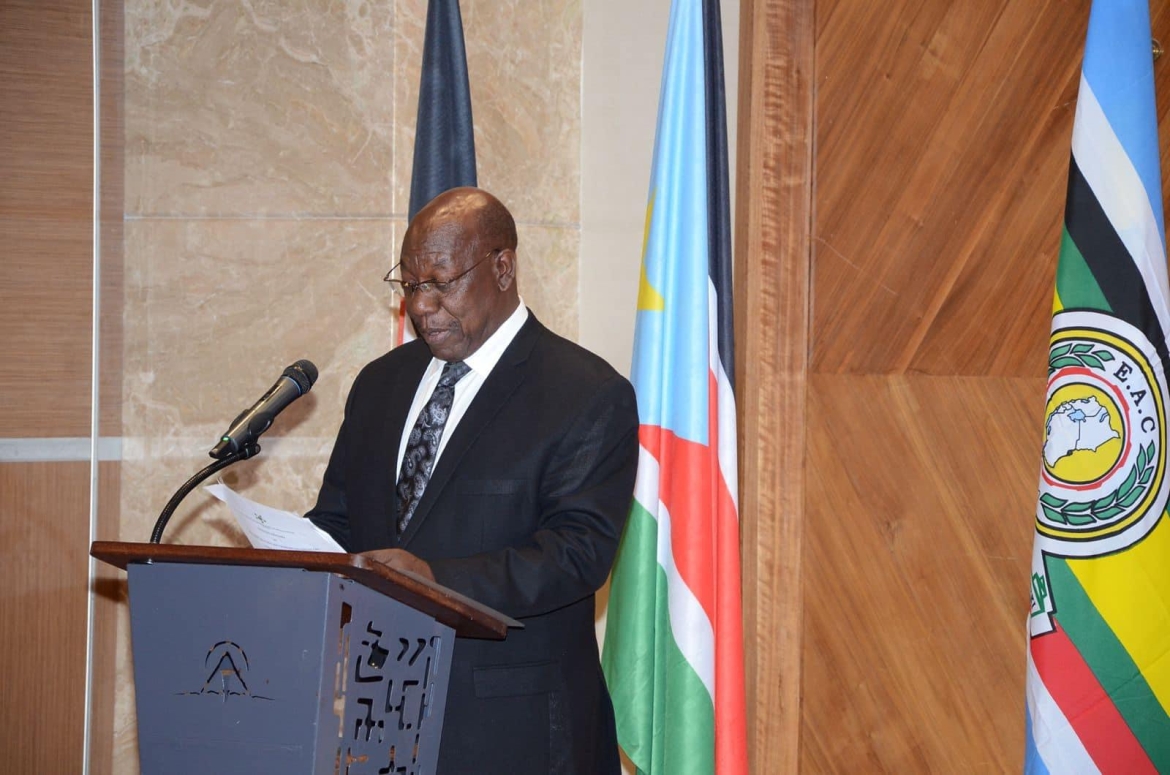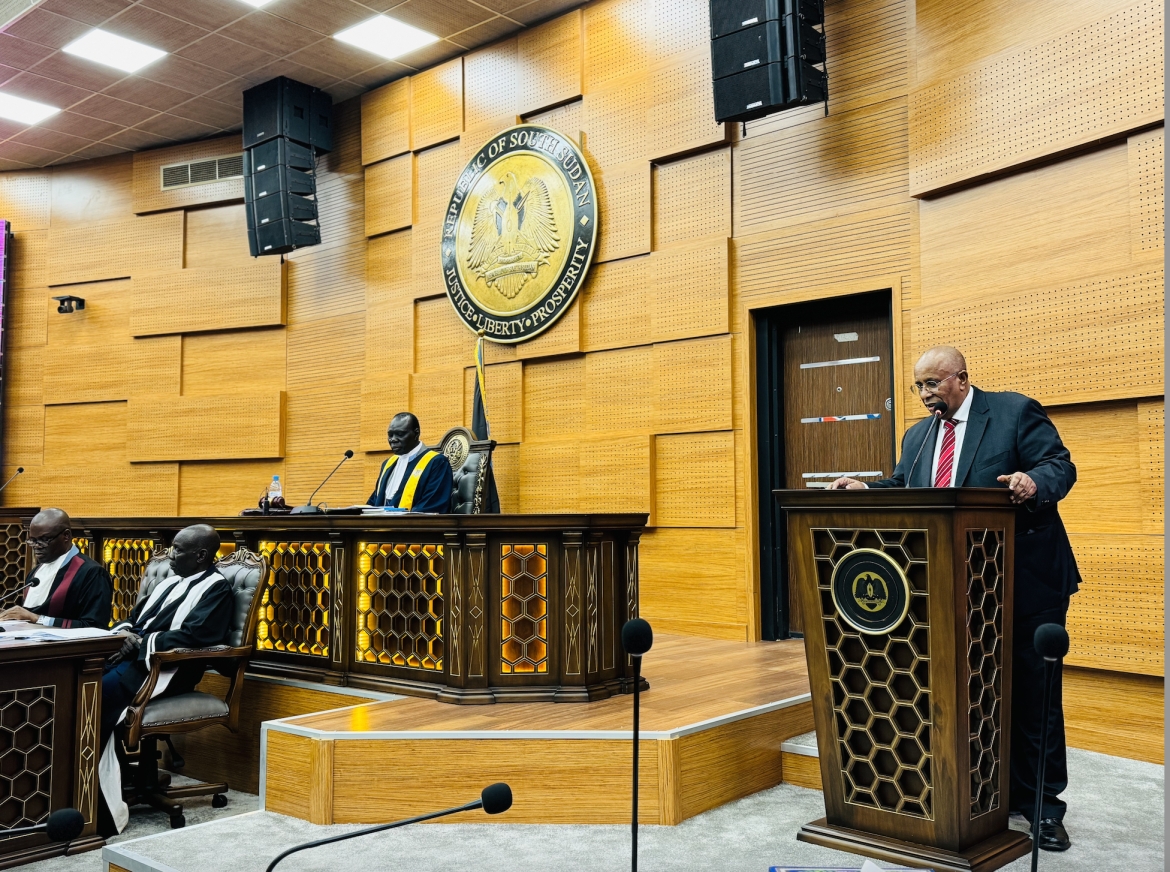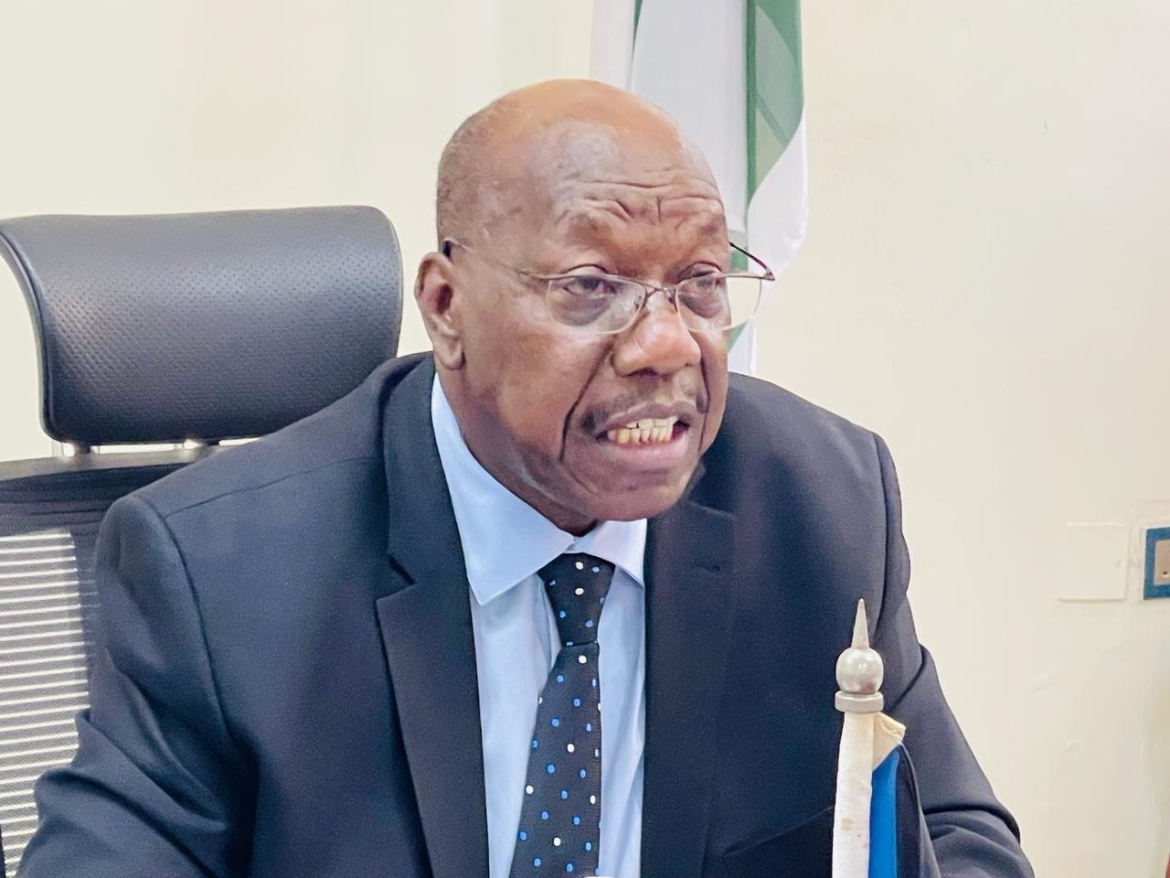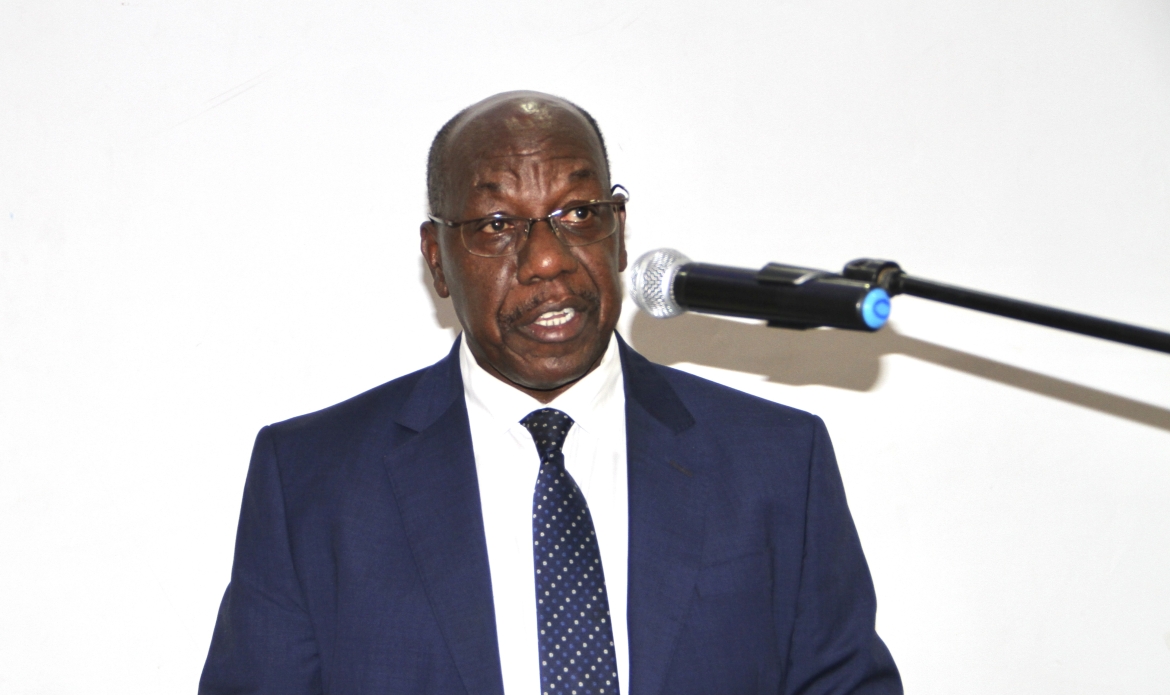INTERVIEW: We are optimistic the revitalised peace Agreement will work, restore peace, says JMEC
JMEC Deputy Chief of Staff-Strategy (Ag) Dr. Thomson Fontaine spoke extensively on the Commission’s recently released status of implementation of the revitalised Agreement update, during an interview with Radio Miraya in Juba on Wednesday. Excerpts:
Audio version available here: https://www.jmecsouthsudan.org/index.php/audio-and-video/item/372-jmec-chief-of-staff-strategy-ag-dr-thomson-fontaine-interview-with-radio-miraya-in-juba-oct-17-2018
Q: One month has elapsed since the signing of the revitalized Peace Agreement, what is your take about the progress made so far, if any?
A: First of all, let me take this opportunity to thank the parties and stakeholders of South Sudan for finally signing this revitalised Peace Agreement. It was a long process, as you know it stretched for over 15 months. We now have a signed comprehensive and inclusive Agreement.
What we have been doing as the Joint Monitoring and Evaluation Commission (JMEC), is to monitor and evaluate the Agreement since its signing. The Parties to the Agreement are expected to carry out certain measures, 15 (D-Day + 15) and 30 days (D-Day + 30) and so on, after the Agreement was signed. We have been looking at what happened and what have not happened since. Now, a month has passed and we noticed that certain deadlines were missed, while some have been met.
The striking one to us is the fact that the Parties to the Agreement were supposed to have sent nominations to the various Agreement institutions and mechanisms, because the way this Peace Agreement is structured, certain institutions and mechanisms are supposed to be set up with the inclusion of all the parties and stakeholders. Most of it revolves around the security arrangements and also the National Pre-Transitional Committee (NPTC), which is a critical Committee that has to oversee the implementation of the Agreement during the first eight months, but some of those have not yet been filled. We therefore, urge the parties to submit their nominations as quickly as possible.
You mentioned from the outset the confidence building measures, we are happy with that because we understand there is need to build trust between and amongst the Parties. We saw the President of South Sudan H.E Salva Kiir meet with the leaders of the various Parties in Khartoum September 22, with face-to-face discussions and he also met with each of the groups separately one-on-one. We find that as a very good gesture because it shows the beginning of building trust between them. This is very important, because there is an understanding that for the Agreement to work, all the Parties must work together.
Q: Just take us through some of the timelines that are supposed to be met within this 30-day period, but are missed.
A: Well, in regards to what has been accomplished, what we have seen is in regards to the setting up of the NPTC, which was supposed to be set up a few days after the signing of the Agreement. That has been accomplished. We now have in place the committee, which will oversee the implementation during the Pre-Transitional period. In fact, this committee will be meeting for the first time this weekend in Khartoum, similarly the National Constitutional Amendment Committee (NCAC) has also been formed and their first meeting is also taking place in Khartoum next Monday 22nd. So we have these two very critical committees in place.
In addition nominations have been received for the International Boundaries Commission (IBC). This Commission is supposed to look after the affairs of the mapping of the states and delineating lines and boundaries. All nominations are in for that as well.
We have also received nominations for the Joint Defence Board (JDB) which is also a critical component of the peace and security arrangement. Once this defense board is formed, it is supposed to look into issues of cantonment, bring the Parties together, carry out training of the national army etc.
All these have to take place. Linked to that, the Chief of Staffs of the IGAD member states are also meeting in Khartoum on Monday to get this mechanism rolling. This can be seen as a definite movement on the ground where the committees are getting to work. In addition the TNLA has on Monday ratified the Peace Agreement, which is a major critical recommendation. It was supposed to happen within seven days, but that has now been done, albeit behind schedule. This is indeed encouraging. All the Parties have ratified the Agreement as well. This can be seen as a steady progress.
Of course, we in JMEC are looking into the fact that some committees have not been formed. We are urging the Parties to send in their nominees. Even for us as JMEC, we have not been reconstituted. Previously we had 29 members, now it is up to 43 members.
I should also mention in regards to what has been accomplished, the Ceasefire and Transitional Security Arrangements Monitoring and Verification Mechanism (CTSAMVM) which is suppose be monitoring and verifying violations on the ground, is up and running. They have had meetings already in Khartoum, fully reconstituted and doing a very robust job. The level of violence has markedly gone down, we have not had any serious reports coming in during the last month with the exception of the reported fighting in Yei during the last week or so. This is a sign the peace is beginning to hold and we are hopeful that will continue into future.
Q: Lets talk about the timelines that have not been met:
A: As I said earlier,one of the main one is of course, not having all the Committees formed. And the reason why I keep stressing this is because until and unless those committees are formed, we cannot move forward with the work of those institutions and mechanisms. For example, the Strategic Defense and Review Board that is supposed to review anything to do with the security arrangements to ensure that the parties are de-militarising and takingweapons out of civilian areas, needs to be reconstituted. We want that to happen as quickly as possible as we move ahead. There are some other committees such as the Joint Military Ceasefire Commission (JMCC), Joint Defence Board and others. Our hope is that once the NPTC starts its work next weekend, it will help in moving this forward.
Q: What would you say about the violations of the cessation of hostilities that have been reported in areas such as Yei and Wau?
A: We have heard of serious violations that were confirmed by CTSAMVM especially in the months of July, and August. We are happy to report that these incidences are down. While we regret that it happened but as I indicated, it seems the peace is taking hold and we are very encouraged by this. Going forward, we must jointly think about how we can move the implementation of the Agreement.
Q: You talking of June and August, but in this month and after the signing of the revitalized Agreement, fighting and displacements were reported in the areas I mentioned.
A: When we get reports of these incidents, CTSAMVM is expected to go on the ground, investigate and verify those alleged violations. They will then report to JMEC and depending on the severity of the report, we are then obligated to report that upwards to the IGAD Council of Ministers. Of importance in this Agreement is that if there are serious violations or incidents reported, once JMEC reports that to the IGAD Council of Ministers, they are obliged within 14 days of receiving this report, to convene an extra-ordinary session to discuss and take corrective measures. Meanwhile, we are awaiting the verification from CTSAMMV because we can’t go by hearsay. It has to be verifiable. Ones that is done, and we are convinced the report is complete; we can then take it to the next level.
Lets briefly talk about those committees you talked about, such as the NPTC. Some people such as activists, women groups are not happy, saying the 35% women representation in those committees as envisaged by the Agreement, is not being respected. As JMEC, what are your concerns?
Yes. We are very much concerned. We conveyed that to all the Parties and Stakeholder. It is one of the key recommendations in the revitalized Agreement that due consideration must be given to proper gender inclusion. In the Executive, for instance 35% of positions must be reserved for women and it should be observed throughout. What we have seen in the initial set of nominations, is this has not been observed. We have written to Parties and expressed our concerns; IGAD has also done the same. In fact in our most recent report, we have an indicator that shows women are slotted an average of 13%, showing we are well short of the 35% requirement. We believe that women have a critical role to play in the implementation of the peace Agreement and the more women are involved, the less likelihood of conflict recurring.
Q: We have about seven months to go before the reconstitution of the Transitional Government of National Unity (TGoNU), are you optimistic that this Agreement will be implemented as signed?
A: Absolutely and I will tell why am optimistic because I have seen a difference in the posture and attitude of the Parties. What we are beginning to sense is ownership of the Agreement, parties appear to be willing, able and wanting to work together. This is not something we saw in the past Agreement and in fact, part of the reason revitalization came about is because the implementation of the 2015 Agreement stalled. We are very encouraged by the conversations taking place at the highest level between leaders. There is the sense of people being tired of this conflict; fatigue setting in and people are yearning for peace. You see this Agreement may not be perfect but its obviously the best we have, people are beginning to rally around it and give it a chance. If implemented it leads to a path of free and fair elections and the growth of democratic institutions and that’s what we must rally towards.
One of the strongest concerns that has come out within this month is the issue of political detainees and prisoners of war not being released. As JMEC, what is your take on this?
According to Chapter II of the Agreement, all political detainees and Prisoners of War (PoWs) must be released. The President made a decree, late last month, announcing the release of PoWs and political detainees. We at JMEC welcomed that announcement at the time and we urged the government to move towards making it a reality. We also urged all the Parties to follow suit and release detainees and PoW’s in their custody. We are hoping this will be done in the not too distant future. We want to see the actual move on this. I should also add that this to us is a low hanging fruit, that if implemented will bring about a tremendous amount of confidence not only to the south Sudanese but also to the rest of the world that is watching.
Q: What are the specific recommendations put forward by JMEC to enable better implementation of the Agreement.
A: Specifically and specially with the NPTC, a lot of focus will be on them, in the coming months because they are charged with the overall responsibility of implementation. So it’s their duty to oversee the various institutions and mechanisms. For example the cantonment of forces, training of a national army etc., and to ensure resources are obtained for that. In the Agreement, the government has agreed to avail an initial amount of resources towards that, and we are urging the international community to support all these efforts. Also of great importance are the security arrangements for the returning members of the opposition and having that comfort that they can come back to a secure environment. That too has to be sorted out.





